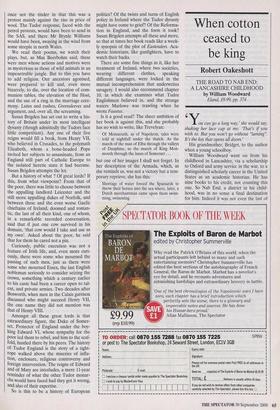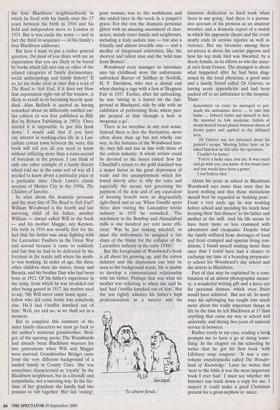When cotton ceased to be king
Robert Oakeshott
THE ROAD TO NAB END: A LANCASHIRE CHILDHOOD by William Woodward Eland, £9.99, pp. 374 You can go a long way,' she would say, shaking her lace cap at me. 'That's if you wish to. But you won't go without "laming". It's the key that opens all doors.'
His grandmother, Bridget, to the author when a young schoolboy.
William Woodward went on from his childhood in Lancashire, via a scholarship to Oxford and army service in the war, to a distinguished scholarly career in the United States as an academic historian. He has nine books to his credit, not counting this one. So Nab End, a district in his child- hood, was in no sense a final destination for him. Indeed it was not even the last of the four Blackburn neighbourhoods in which he lived with his family over the 17 years between his birth in 1916 and his bold and independent move to London in 1933. But is was easily the worst — and in fact the third in sequence — of his family's four Blackburn addresses.
But here I want to put a rather general question. Do most of you share with me an expectation that you are likely to be bored by books which fall into one or other of the related categories of family documentary, social anthropology and family history? If so, let me make clear at once that a read of The Road to Nab End, if it does not blow that expectation right out of the window, is likely to result in its becoming heavily qual- ified. Alan Bullock is quoted as having remarked about its differently entitled ear- lier edition (it was first published as Billy Boy by Ryburn Publishing in 1993): 'Once started it is impossible to put this book down.' I would add that if you have any interest in working-class life in a Lan- cashire cotton town between the wars, this hook will tell you all you need to know without inflicting more than a nano-second of boredom in the process. I can think of only one other example of a family history which told me in the same sort of way all I needed to know about a particular place at a particular time: Oscar Lewis's classic account of Mexico City in the 1950s, The Children of Sanchez.
So what about the dramatis personae and the story line of The Road to Nab End? William Woodward is the fourth and last surviving child of his father, another William — always called Will in the book — and his mother Maggie, née Keynon. His birth in 1916 was notable first for the fact that his father was away fighting with the Lancashire Fusiliers in the Great War and second because it came so suddenly and fast that he had to be delivered by the foreman in the textile mill where his moth- er was working. In order of age, the three other children were his sisters, Jenny and Brenda, and his brother Dan who had been born in 1912. Of his father's experience in the army, from which he was invalided out after being gassed in 1917, his mother used to say, 'My Will never came home again . fellow who did come home was somebody else. He'd had t'stuffin knocked out of him.' Well, yes and no, as we shall see in a moment.
But to complete this summary of the inner family characters we must go back to the author's maternal grandmother, Brid- get, of the opening quote. The Woodwards had already been Blackburn weavers for two generations when Will and Maggie were married. Grandmother Bridget came from the very different background of a landed family in County Clare. She was sometimes characterised as 'royalty' by the Blackburn neighbours, but in a friendly and sympathetic, not a sneering way. In the life- time of her grandson she hardly had two pennies to rub together. Her last 'outing', poor woman, was to the workhouse and she ended later in the week in a pauper's grave. For the rest the dramatis personae glitter with an amazing assortment of char- acters, mainly outer family and neighbours, including a truly sadistic nun — but also a friendly and almost loveable one — and a medley of fairground celebrities, like the shortest and tallest man and the 'wild man from Borneo'.
Woodward even manages to introduce into his childhood story the unfortunate unfrocked Rector of Stacey in Norfolk, H. F. Davidson, who met a dismal end when sharing a cage with a lion at Skegness Fair in 1937. Earlier, after his unfrocking, he was 'sitting in a barrel on the fair- ground at Blackpool, side by side with an exhibition of performing fleas, where peo- ple peeped at• him through a hole at twopence a go'.
There is no storyline in any real sense. Instead there is first the fluctuation, more often down than up but not wholly one way, in the fortunes of the Woodward fam- ily; they fall and rise in line with those of the cotton industry. A whole review could be devoted to the issues raised: how far Churchill's return to the gold standard was a major factor in the great depression of trade and the unemployment which fol- lowed shortly after it; why the rules and especially the means test governing the payment of the dole and of any equivalent of housing benefit were so disgracefully tight-fisted and so on. When Gandhi spent three days visiting the Lancashire textile industry in 1931 he remarked, 'The machinery in the Bombay and Ahmadabad mills is one hundred per cent more effi- cient.' Was he just making mischief, or must the mill-owners be assigned a fair share of the blame for the collapse of the Lancashire industry in the early 1930s?
But the foreground of Woodward's book is all about his growing up, and the cotton industry and the depression can best be seen as the background music. He is unable to develop a conversational relationship with his father. Perhaps that was what his mother was referring to when she said he had tad t'stuffin knocked out of him'. But the son rightly admires his father's high professionalism as a weaver and his `To absent fiends.' immense dedication to hard work when there is any going. And there is a persua- sive account of his prowess as an amateur wrestler, and a dramatic report of a match in which his opponent cheats and the event nearly ends in serious injuries as well as violence. But my favourite among these set-pieces is about his carrier pigeons and how his top male bird was thwarted, by a decoy female, in its efforts to win the annu- al race from France. The strangest is about what happened after he had been diag- nosed by the local physician, a good man and a family friend called Dr Grieves, as having acute appendicitis and had been packed off in an ambulance to the hospital. Then:
Somewhere en route he managed to per- suade the ambulance driver ... to take him home ... [where] father put himself to bed. He resorted to folk medicine: fistfuls of steam-heated bread placed between sheets of brown paper and applied to the inflamed area.
Dr Grieves was not informed about his patient's escape. Meeting father later on he asked him how he felt after the operation.
'Couldn't be better.'
'You're a lucky man, you are. It was touch and go with you, you know. A few hours later and you would have been a goner.'
'I can believe that.'
About his years at school in Blackburn Woodward says more than once that he learnt nothing and that those institutions should best be regarded as 'holding pens'. From a very early age he was working before school and spending his lunch hour ferrying their 'hot dinners' to his father and mother at the mill. And his life seems to have been more or less crammed with adventures and escapades. Despite what the family suffered from shortages of food and from cramped and spartan living con- ditions, I found myself wishing more than once that I could have had a chance to exchange my time at a boarding preparato- ry school for Woodward's day school and the streets in Blackburn.
Part of that may be explained by a com- bination of an almost photographic memo- ry, a wonderful writing gift and a keen eye for personal dramas, which even Ibsen would have admired. But not all. In many ways his upbringing has taught him much more about the really important things in life by the time he left Blackburn at 17 than anything that came my way at school and university, and during two years of national service in between.
Rather rarely in my case, reading a boor prompts me to have a go at doing 'some- thing. In the chapter on his schooling he writes that he got his first book 'with Lifebuoy soap coupons'. 'It was a one- volume encyclopaedia called The Wonder- land of Knowledge.' Later he writes that `next to the bible it was the most important book I ever had.' I must see whether the Internet can track down a copy for me. I suspect it could make a good Christmas present for a great-nephew or -niece.



























































































 Previous page
Previous page